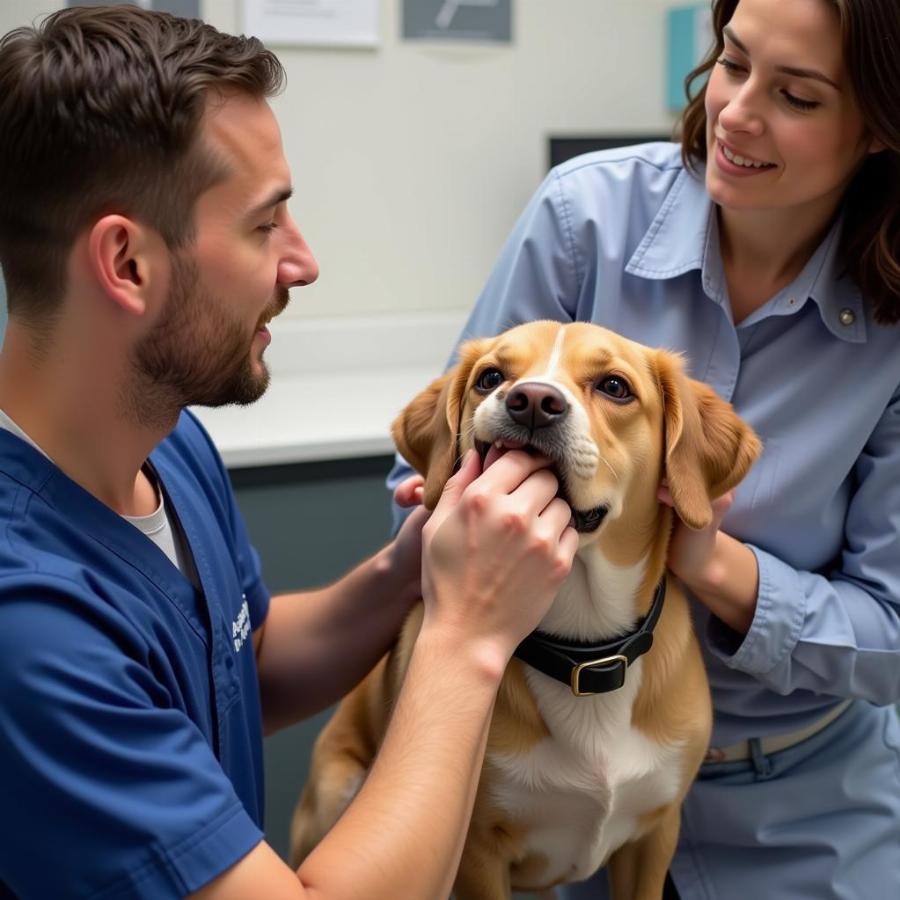If your furry friend is suddenly listless and drooling, it’s natural to be worried. “Dog listless and drooling” can indicate a range of issues, from relatively minor inconveniences to serious health concerns. Understanding the potential causes and knowing what steps to take can make a significant difference in your dog’s well-being. This article will explore the various reasons why a dog might exhibit these symptoms and guide you on the appropriate actions to ensure your pet receives the necessary care.
Why is My Dog Listless and Drooling?
A listless dog is usually inactive, unresponsive, and shows little interest in their usual activities. Combined with excessive drooling, this can signal several potential problems. Let’s delve into some of the common culprits:
Oral Issues
One of the most obvious reasons for drooling and lethargy is a problem in your dog’s mouth. A foreign object lodged in their gums, a broken tooth, an abscess, or oral injuries can cause significant discomfort, leading to decreased activity and increased salivation.
Nausea and Upset Stomach
Just like humans, dogs can experience nausea and stomach upset, which often manifest as listlessness and drooling. This could be due to dietary indiscretion (eating something they shouldn’t), a change in diet, or even a viral infection.
Heatstroke
Heatstroke is a serious condition that can be life-threatening for dogs. Excessive panting, drooling, weakness, and lethargy are all telltale signs of heatstroke. If you suspect your dog is suffering from heatstroke, seek immediate veterinary attention.
Poisoning
Ingestion of toxins, whether it’s poisonous plants, household chemicals, or certain human medications, can cause a wide range of symptoms, including lethargy and drooling.
Neurological Problems
Certain neurological conditions, such as vestibular disease, can also cause a dog to be listless and drool. These conditions often present with other neurological signs like head tilting, loss of balance, and circling.
What Should I Do If My Dog is Listless and Drooling?
Seeing your dog unwell can be distressing, but knowing the right steps to take can help you navigate the situation effectively.
Observe Your Dog Closely
Take note of any other symptoms your dog might be exhibiting, such as vomiting, diarrhea, difficulty breathing, or changes in behavior. This information will be crucial for your veterinarian.
Check for Oral Issues
Carefully examine your dog’s mouth for any obvious signs of injury, foreign objects, or swelling. Be cautious, as a dog in pain might bite.
Contact Your Veterinarian
If your dog’s symptoms are severe, sudden, or accompanied by other concerning signs, contact your veterinarian immediately. Even if the symptoms seem mild, it’s always best to err on the side of caution and seek professional advice.
Provide a Comfortable Environment
Make sure your dog has a quiet, comfortable place to rest. Offer small amounts of fresh water to keep them hydrated, but don’t force them to drink.
 Veterinarian Examining a Listless and Drooling Dog
Veterinarian Examining a Listless and Drooling Dog
Is Excessive Drooling Normal in Dogs?
While some drooling is normal in dogs, especially in breeds like Bulldogs and Mastiffs, excessive drooling coupled with listlessness is usually a sign that something is wrong.
Can Anxiety Cause Drooling in Dogs?
While anxiety can sometimes cause increased salivation, it’s less likely to be the primary cause of excessive drooling and listlessness. However, if your dog is experiencing anxiety, addressing the underlying cause is essential.
When is Drooling an Emergency?
Drooling becomes an emergency when it’s accompanied by other concerning symptoms such as difficulty breathing, vomiting, collapse, seizures, or signs of poisoning. In such cases, immediate veterinary care is crucial.
Conclusion
“Dog listless and drooling” are symptoms that shouldn’t be ignored. While some causes might be minor, others can be serious and require immediate veterinary attention. By observing your dog closely, gathering relevant information, and seeking professional advice, you can ensure your furry friend receives the appropriate care and gets back to their usual happy self.
FAQ
- What are the common causes of drooling and lethargy in dogs? Oral issues, nausea, heatstroke, poisoning, and neurological problems are common causes.
- Should I induce vomiting if I suspect my dog has been poisoned? No, never induce vomiting unless instructed by your veterinarian. Some substances can cause further damage if vomited.
- How can I prevent heatstroke in my dog? Ensure your dog has access to shade and plenty of fresh water, especially during hot weather. Avoid strenuous exercise during the hottest parts of the day.
- What are the signs of an oral infection in dogs? Bad breath, excessive drooling, redness or swelling of the gums, difficulty eating, and pawing at the mouth.
- Can teething cause drooling in puppies? Yes, teething can cause increased drooling in puppies.
More Helpful Resources on Beaut Dogs
- Dog Health and Wellness Guide
- Understanding Dog Behavior
- Choosing the Right Food for Your Dog
Beaut Dogs is your ultimate resource for all things related to dog care. We provide reliable and expert advice on everything from breed selection to health, nutrition, and training. Beaut Dogs is committed to helping you navigate the wonderful world of dog ownership and provide the best possible care for your beloved companion. When in need of assistance, contact Email: [email protected] so that Beaut Dogs can answer in detail and accurately. Visit us at https://beautdogs.com today!